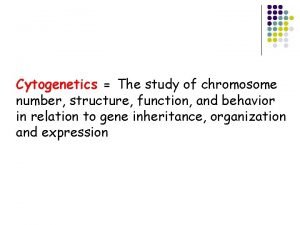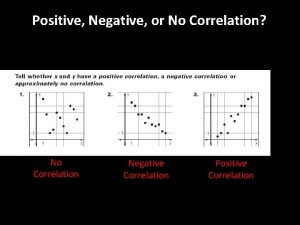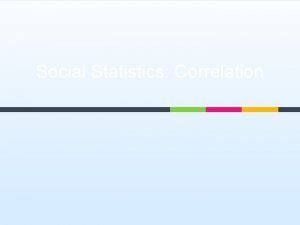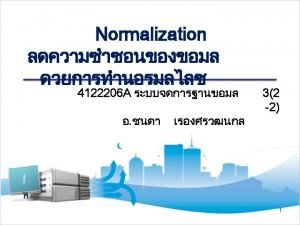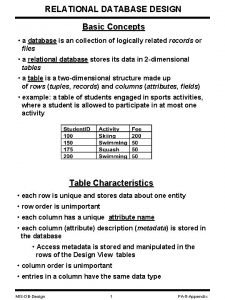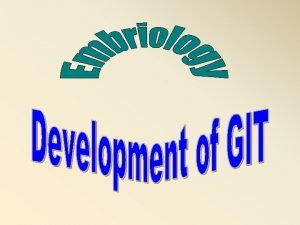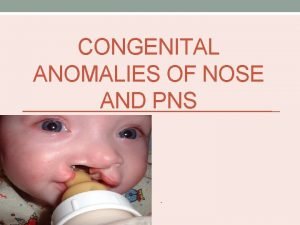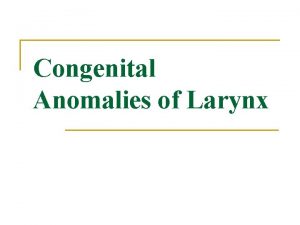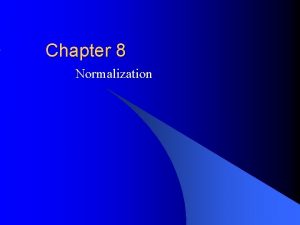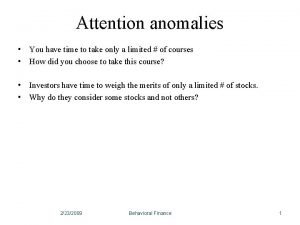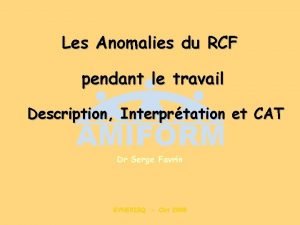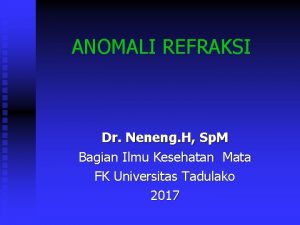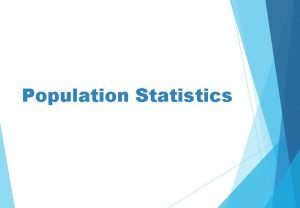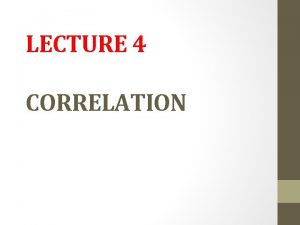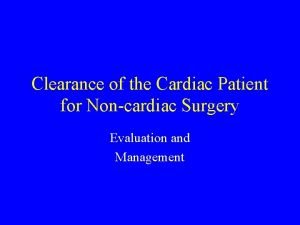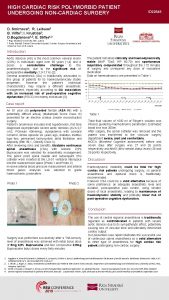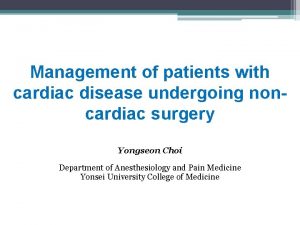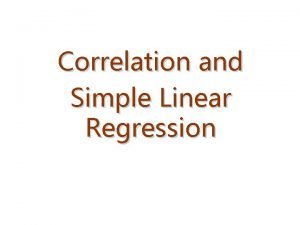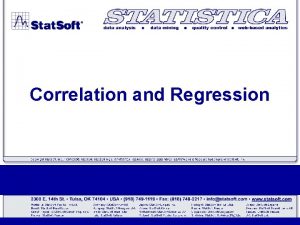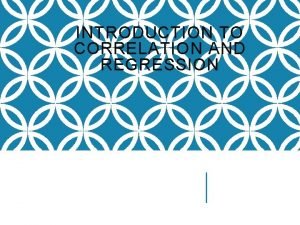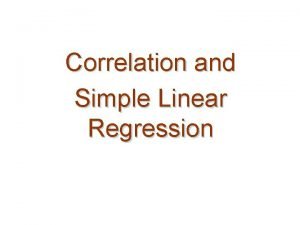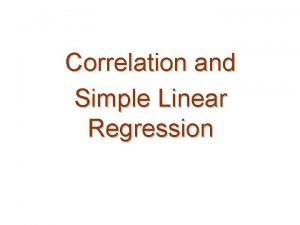CYTOGENETIC CORRELATION OF CARDIAC AND NONCARDIAC ANOMALIES IN












- Slides: 12

CYTOGENETIC CORRELATION OF CARDIAC AND NON-CARDIAC ANOMALIES IN DOWN SYNDROME Dr. D. K. Chopade President, Down Syndrome Care Association, India Genetic Health & Research Centre, 7, Mahatmanagar, near ABB signal, Triambak Road, Nashik, Maharashtra Presentation at IIDSC -2017 New Delhi 10/09/2017

Introduction: § It is the most common genetic disorder in the world § Incidence: 1 in 1000 § Types as per chromosomal abnormalities: Sr Type of Down No Syndrome Chromosomal abnormality Prevalence 1 Free Trisomy 21 Three separate copies of chromosome 21 94% 2 Translocation Down syndrome Extra copy of chromosome 21 is attached to other chromosomes like 21, 22, 13, 14 or 15 3. 3% 3 Mosaic Down syndrome Some cells show normal 46 chromosomes, while others show extra 21 2. 4%

Karyotype of a boy with free trisomy 21 Down syndrome Karyotype of a girl with 14; 21 Robertsonian translocation Down syndrome Karyotype of a boy with 21; 21 Robertsonian translocaton Down syndrome

Clinical Features reported Sr Principle features observed No % Sr No Major Congenital malformations observed % 1 Hypotonia 80 1 CNS- Mental deficiency 100% 2 Hyperflexible of joints 80 2 40% 3 Excees skin on back of neck 80 4 Flat face 90 Cardiac- Atrioventricular defects Ventricular septal defects Patent Ductus arteriosus Atrial septal defects 5 Slanted palpebral fissures 80 3 12% 6 Abnormal auricles 60 7 Dysplasia of middle phalynx 60 8 Dysplasia of pelvis 70 9 Simian crease 45 Gastro-intestinal abnormalities Tracheoesophageal fistula Duodenal atresia Pyloric stenosis Hirschprung disease Imperforate anus The major cause of early mortality is- Congenital heart defect

The aim of this study To establish the clinical and cytogenetic correlation in the individuals with Down’s syndrome Study Design § § § Retrospective analysis 482 individuals with Down syndrome, Methods: clinical and cytogenetic evaluation Period-2003 to 2015 Place of study-Genetic and Health Research Centre, Nashik, India.

Results Table No: 1 Clinical Correlation with the different types of chromosomal abnormalities in Down’s syndrome (n=482 M: F- 1. 4: 1)Types of CA M Free Trisomy 21 F Total 249 173 422 Cardiac Non-Cardiac Anomalies 186/422 (44. 1%) 85/422 (20. 1%) CA in parents (n=36) Not available RT 21; 21 (n= 36) 21; 22 7. 470% 14; 21 12 -07 07 06 19 - 52. 77% 13 - 36. 11% 9/19 (47. 36%) 7/13 (53. 85%) 4/19 (21. 1%) 3/13 (23. 1%) 45, XY, t(21; 21)- 1 45, XX, t(14; 21)- 3 45, XY, t(14; 21)- 1 13; 21 15; 21 Mosaicism- 03 10 01 12 04 - 11. 11% 22 02/4 (50%) 03/10 (30%) 00 00 45, XY, t(15; 21)- 1 Not available 0 02 00 00 Not available 87. 55% 4. 56% No obvious CA 02 MMale, F- Female, 283 RT- Robertsonian CA-(42. 9%) Chromosomal Abnormality Total 199 482 Translocation, 207/482 92/482 (19. 1%)

Results Table No 2: Various Congenital cardiac Anomalies observed Cardiac Anomalies (207) No of cases % Atrioventricular Septal Defect 105 Ventricular Septal Defect Atrial Septal Defects Patent Ductus Arteriosus Tetralogy of Fallot Total 62 17 17 06 207 RT- Robertsonian Translocation Chromosomal abnormalities Free trisomy RT Mosaic 51 95/105 (90. 5%) 10 (9. 5%) - 30 8 8 3 100 60/62 (96. 7%) 13/17 (76. 5%) 5/6 (83. 3%) 186/207 (89. 85%) 2 (3. 3%) 2 (11. 7%) 3 (17. 6%) 1 (16. 7%) 18 2 (11. 7%) 1 (5. 9%) 3

Results Table No. 3: Various Non-cardiac Anomalies Observed (Total Number- 92) Chromosomal abnormality Duodenal atresia Imperforate anus Hirschprung’s disease Total (92 cases) Free trisomy 21 (422) 36 21 17 74 (80. 43%) t(21; 21) +21 (19) 5 3 2 10 t(14; 21) +21 (13) 3 3 1 7 t(15; 21) +21 (4) - 1 Mosaicism (22) - - 44 28 20 92 Total 18 (19. 56%)

Main findings of our study § Frequency of various chromosomal abnormalities observed§ Free trisomy 2187. 55% § Robertsonian Translocation- 7. 47% § Mosaicism 4. 56% § Male to Female ratio observed is 1. 4: 1 § 2 cases did not show any chromosomal abnormality § The most common Robertsonian translocation found was – t(21; 21) followed by t(14; 21) § Parents of children with Robertsonian translocation Down syndrome showed balanced Robertsonian translocation at a frequency of 16. 7% (6/36)

§ CHD was observed in 42. 95% of all cases with DS § The most common cardiac anomaly observed is Atrioventricular septal defect in 51% cases § Atrioventricular septal defect was observed with the highest frequency in translocation DS cases § Chromosomal abnormalities in children of DS with cardiac defects§ Free trisomy 2189. 85% § Robertsonian translocation- 8. 70% § Mosaicism 1. 45% § Non-cardiac anomalies observed- Duodenal atresia in 9%, imperforate anus in 6% and Hirschprung disease in 4% cases of DS

Conclusion § There is a close association between various types of chromosomal abnormalities and cardiac and non-cardiac malformations § The extra genetic material on chromosome 21 playes a vital role in development of major congenital malformations § All the children with Down syndrome should be investigated for the major cardiac and non-cardiac malformations

Thank you so much…… Dr. Dnyandeo Chopade Director and Consultant Medical Geneticist Genetic Health & Research Centre, Nashik Email- drchopade@Hotmail. com Mobile- + 91 9822885558
 Cytogenetic band
Cytogenetic band No correlation
No correlation Positive correlation versus negative correlation
Positive correlation versus negative correlation Data redundancy and update anomalies
Data redundancy and update anomalies Database anomalies
Database anomalies Vitelline fistula
Vitelline fistula Most common congenital anomalies
Most common congenital anomalies Larynx
Larynx Modification anomalies
Modification anomalies Attention anomalies finance example
Attention anomalies finance example Anomalie rcf
Anomalie rcf Accommodation anomalies
Accommodation anomalies Convex population pyramid
Convex population pyramid
